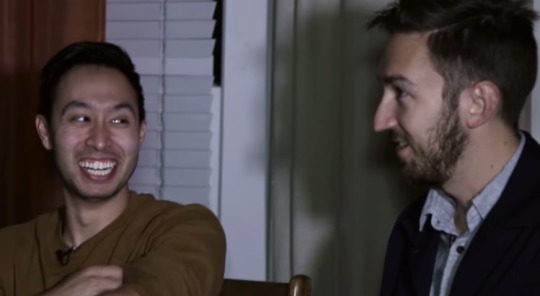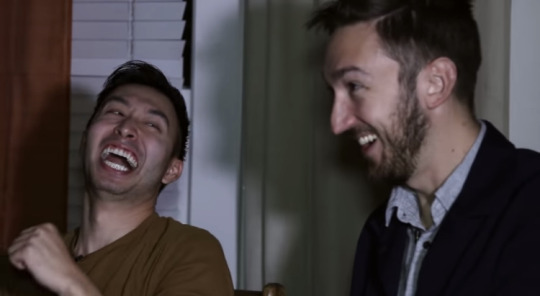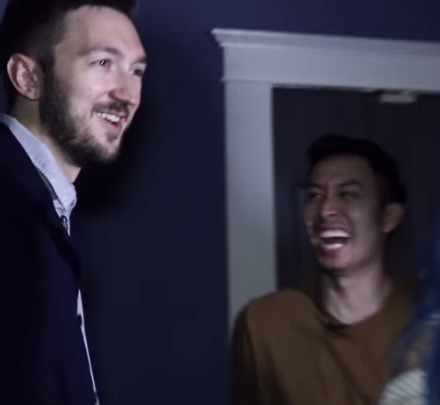#to saying that the girl’s cluster headaches were sign of possession instead of a medical condition
Text





i think about these pictures from the buzzfeed exorcism video literally every day because even through the uncomfortability and awkwardness that was that video, shane was still right there making ryan laugh, and i think that’s so nice :)
the only besties that matter i fear! :)
#maybe it was just me but i found this video really weird#between the priest literally saying he skips part of the ritual#to saying that the girl’s cluster headaches were sign of possession instead of a medical condition#to saying that she had a “demon in her womb” like what?!?#and then telling shane and ryan they should be dead like huh?!? 🤨#everyone looked kinda uncomfy to me#idk maybe it was just me tho 🤷🏻♀️#watcher#watcher entertainment#we are watcher#ryan bergara#shane madej#shane and ryan#besties fr#buzzfeed unsolved#exorcism
204 notes
·
View notes
Text
#TBT: Privately Talking about a Public Issue: Ganja, or How I Cope with the World

originally written 4 May 2009
“Participate joyfully in the sorrows of the world. We cannot cure the world of sorrows, but we can choose to live in joy.” – Joseph Campbell
Reporters surround Paul McCartney as he holds his index finger up, microphones and tape recorders desperately wavering in front of his face. He nonchalantly chews on a piece of gum as he makes a speech after his 1984 arrest in Barbados for possession of marijuana: “I’m telling you, this substance cannabis, is a whole lot less harmful than rum punch, whiskey, nicotine, and glue—all of which are legal…I would like to see it decriminalized, because I don’t think, in the privacy of my own room, I was doing anyone any harm, whatsoever.”
Bob Dylan first introduced McCartney and the remaining Beatles to pot in 1964 at the Delmonico Hotel in New York. And this wasn’t the first time McCartney was busted for possession of marijuana: in 1973 police found cannabis plants growing on his farm, and in 1980 he spent ten days in a Tokyo jail for smuggling nearly eight ounces into the country.
Cannabis, native to Asia, produces tough fiber, called hemp, which is used to make rope or fabric. Dried flower clusters and leaves of the plant are known as marijuana or hashish and contain THC, a psychoactive chemical that produces a euphoric sensation when smoked or ingested. Recorded by the Scythians as early as 500 B.C., marijuana was used across Europe as a “benevolent therapeutic plant, capable of soothing pain, calming anxiety, promoting appetite and digestion and relieving both headaches and nervous convulsions” up until the 20th century (Crawford 2002).
However, many say that marijuana today is significantly different from the marijuana of the Hippie era—and surely from the time of the Scyths—because of “special fertilizers, plant hormones and steroids, carbon dioxide and advanced horticulture techniques…to produce the highest grade, most potent variety.” In contrast to the 1970s in which the “THC content of a marijuana plant was 1.5 percent,” today it ranges from 8 to 20 percent (Greene 1). And it “can impair users’ coordination, balance, and sense of time and distance,” which could be problematic in the workplace and in terms of driving under the influence (Plumb 2).
As early as 1936, anti-marijuana propaganda began to ooze in the United States, beginning with the full-length feature film Reefer Madness. In the movie, the effects of the marijuana compel one man to beat another to death as a woman watches, her shrieks gradually transforming into menacing giggles. The film insinuates that marijuana breeds a loss of control, a disconnection with reality, and intense violence—three things that desperately needed to be combated. The social stigma of drug use held strong until the 1960s, when recreational use became more mainstream and was coupled with protest and rebellion during a time of political unrest. In the 1970s, the Nixon administration officially declared a “war on drugs,” making illegal substances “public enemy number one in the United States” (PBS, 2008).
As something that a person does privately, it is ironic that marijuana use has become the “public enemy.” Marijuana users generally aren’t thought of as out of control or intensely violent, as portrayed in Reefer Madness. In pop culture, they are presented as comedic characters who are perhaps slightly out of touch with reality: Cheech and Chong, Jay and Silent Bob, Harold and Kumar, and the joint-smoking duo of blockbuster Pineapple Express. Each pair becomes involved in some sort of misadventure—generally while stoned—but ultimately turns out able-bodied enough to land a happy ending, usually eliciting laughs instead of leaving a trail of mutilated bodies in their wake. Marijuana users aren’t terrorizing our cities—they’re supposed to be euphoric: sitting on their couches, eating bags of potato chips, and laughing hysterically at Golden Girls. Why should smoking pot be any of the government’s concern if it isn’t causing anyone harm?
In this case, it isn’t the users doing the harm—it’s the sellers. Mexican drug cartels operating in the United States pull in billions of dollars a year with marijuana accounting for nearly two-thirds of their income (The Washington Post 2009). To smuggle their goods across the border and turn a profit, the five major Mexican cartels will go to whatever lengths: beheading Mexican police officials and pumping the chests of rivaling cartel members full of bullets. The American city of El Paso, considered the second safest city of its size, had only 15 murders in 2008; the Mexican City of Juarez, infested with drug lords and unable to impose law and order, had around 1,300. The only thing dividing the two: a thin border. Many Americans are concerned that the violence will soon spill over, and instead of having a primarily drug consumption problem, we’ll be dealing with powerful narcotics leaders who easily dispose of anyone in their way (Campo-Flores and Campbell 2008). In a CNN interview, Secretary of State Hillary Clinton sullenly says, “Obviously, our demand for drugs is what motivates these drug gangs; if they didn’t think they were going to make a bunch of money across the border, they’d go into another line of work.”
As I stand on the corner of University and 8th Street, a truck filled with protesters slowly hurdles by, dozens of others following in the vehicle’s path, holding their signs and banners. People pause on the sidewalk to watch, the distinct smell of marijuana wafting through the air, police officers following behind the group nonchalantly. The signs read “Stop the drug war,” “America’s largest cash crop,” “Cures not wars,” “End the prison state,” and “Stop the lies, legalize.” This is the annual New York/Worldwide Marijuana March, which typically takes place at the beginning of May every year with over 250 cities participating. On their MySpace page, riddled with images of marijuana leaves, the organization says that it aims to “end the drug war, decriminalize users, end the Rockefeller drug laws, and protect the rights of individuals with chronic diseases including HIV/AIDS to access medical marijuana.” The idea of legalization would help economically as well as theoretically decreasing the power and profits of drug cartels: “California’s chief tax collector said that the measure would bring in $1.3 billion a year and save another $1 billion on enforcement and incarceration” (The Washington Post 2009).
But not everyone agrees; during his virtual town hall meeting on March 26, President Barack Obama strutted around in the fashion of a stand-up comedian, a smirk on his face as he coolly said, “There was one question that was voted on that ranked fairly high, and that was whether legalizing marijuana would improve the economy and job creation….and uh….I don’t know what this says about the online audience…” he laughs, trailing off for a moment, the audience in the background clearly amused. “The answer is no, I don’t think that is a good strategy to grow our economy,” he says simply and is awarded an applause. For a question that was voted on by 3.5 million viewers, this was a cop out for Obama.
Perhaps the marijuana question isn’t so easy to answer though. There are contradictory studies from each side: marijuana impairs health, or it should be used as a pharmaceutical; we should continue the war on drugs and hope that the killings of innocent people in Mexico don’t escalate or spread to our side of the border, or we should legalize, tax it, and hope that it doesn’t create a epidemic of harder drug use. Perhaps we shouldn’t be so concerned with the effect of drugs. Instead, we should wonder why the idea of being high is so appealing in the first place. As John Lennon wisely said in an interview on the Dick Cavett show, “I think the basic thing that nobody’s asked is why do people take drugs of any sort…why do we, and you, and anybody have to have these accessories to normal living—to live…is there something wrong with society that’s making us so pressurized that we cannot live in it without guarding ourselves against it? I think if people were allowed to be a bit more free and express themselves then they wouldn’t have to inhibit themselves by taking drugs…people take drugs and drink so as they don’t feel what’s going on around them.”
In a country predominantly focused on the horrors of the world—and this isn’t necessarily a bad thing, atrocities should be recognized in order to attempt to repair them—we are continually shown images of raging wars, starving children, and genocides that seem completely hopeless in fixing. We’re constantly looking for an escape, a way to be satisfied in a world that is so full of suffering. Euphoria has to be achieved some way: through substances such as alcohol, marijuana, cigarettes, painkillers, or anti-depressants. We’re constantly trying to escape the state we’re in, whether it consists of our own personal problems or the problems plaguing the world. We’re past the times of simplicity that existed before the Industrial Revolution, and there’s no way to go back to them; instead, we’re stuck in a complex world of anxiety, paranoia, disillusionment, and cynicism. The public and the private are indefinitely tied together: the public creates a world we privately want to escape from and our private activities become a public issue of good or bad. Whether it be your right to end your own life, to stick a needle in your arm, to abort something growing inside of you, to marry the same sex: there’s always the issue of control and whether the government has the right to tell you what’s best for you. Do you know what’s best for you or do you need a Big Brother?
0 notes